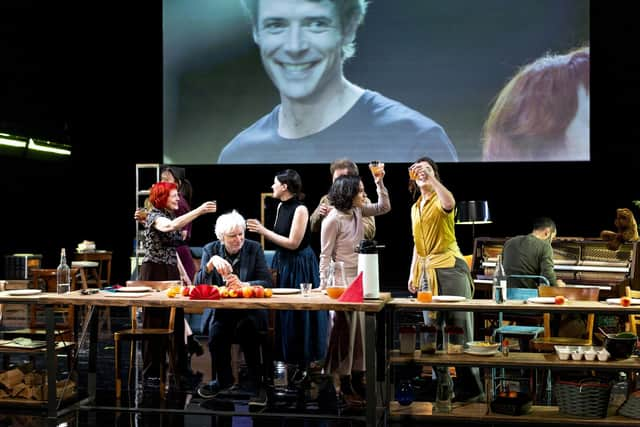Edinburgh International Festival preview: Dusk
You could be forgiven for thinking Dusk was a straight stage adaptation. The publicity for the play, which runs at the start of the Edinburgh International Festival, is up-front about its connection to Dogville, the 2003 Lars von Trier movie starring Nicole Kidman.
This was the strikingly original film about an enigmatic woman called Grace Mulligan who arrives in an isolated town in the Rocky Mountains, evidently in distress. Played by a curiously serene Kidman, Grace seems to be on the run from the mob, although her past remains mysterious. Having given her a cautious welcome, the locals warm to her sunny disposition and everything seems to be going her way. When the police come sniffing, however, the townsfolk turn on her. An idyllic community starts to show its underside. It is not pretty.
Advertisement
Hide AdBut although Dogville is central to Dusk, the Plame d'Or-nominated movie was not the starting point. The first thought of writer and director Christiane Jatahy was to create a show about the status of the outsider. Von Trier's movie could help her do that because it was about the cruelty of apparently good people to strangers.


"I always say that it’s not an adaptation of this film," she says of the Comédie de Genève production. “It is a dialogue, a fight, a tension between the story of the film and what you can do in the present moment of the theatre in order not to repeat this kind of story.”
What we get in Dusk, then, is a play about a company of actors who are joined by Graça (Julia Bernat), a woman who has escaped Brazil’s authoritarian regime and hopes to find acceptance in this new community. It looks promising: they are rehearsing their own version of Dogville and questioning a story in which Kidman’s character placidly accepts the townsfolks’ punishments. Might there be a way for Grace/Graça to resist being othered and to become a proper part of the community – or will the newcomer be ostracised herself?
“This is the way I have appropriated the film,” says Jatahy. “We have this past – in this case, the film – and the characters in the present want to accept the other and not be the same, with the same prejudices, the same thoughts. But when menace arrives, they forget the desire to change.”
For the director, this resonates with the politics of Brazil. “The colonial heritage never really changed,” says Jatahy, relieved to see the end of President Bolsonaro’s regime, but conscious of her country’s history of dictatorship and intolerance. “The violence against black people, indigenous people and LGBT people is part of the same story. We still have to work a lot to change.
“In Brazil, we went from 20 years of dictatorship, when a lot of people close to us died for democracy, to a time when it was possible, through democracy, to vote for a man who said the dictatorship did not exist and that indigenous population were not real people.”
Advertisement
Hide AdDusk, however, is not only aimed at audiences who have lived through the Bolsonaro era. Rather, it asks all of us to question how we might behave when things are not going our way. “It is about our responsibility for our actions,” she says. “A lot of people say, ‘I’m a good person,’ but they vote for Bolsonaro and believe in this narrative that justifies everything. The play is about us as human beings. How can we work together and not repeat the same stories?”
Jatahy’s work has been little seen in the UK, save a project as part of the London Olympics in 2012, but in Europe, the USA and her native Brazil she is celebrated as a major artistic force. At the 2022 Venice Biennale, she was awarded the Golden Lion for Lifetime Achievement in Theatre.
Advertisement
Hide AdBorn in Rio de Janeiro in 1968, she loves to combine theatre and cinema, as she did in What If They Went To Moscow?, a variation on Chekhov’s Three Sisters which half the audience saw on stage and half on film (they swapped at the interval). Working in both media, Jatahy is fascinated by Von Trier’s movie, with its set replaced by chalk lines, its scenes divided by Brechtian titles and its unnatural edits. This is a film that never lets you forget it is a film. It has a playfulness more typical of theatre. Dogville asks the audience to join in its stylistic game, making us active not passive.
“It is a theatrical film,” she says. “I work on the opposite side of the mirror, seeing how I can use cinema in theatre. I like to work at the limits and to break the borders.”
Dusk is part of her continued consideration of the plight of refugees and those who are seen as other. It is the first in a “trilogy of horror”, along with Before The Sky Falls (toxic masculinity via Macbeth) and After The Silence (structural racism).
“The trilogy tries to think about a structure that opens the space for things like Bolsonaro and the extreme right to arrive,” she says. “With Dusk, I asked myself how it was possible for the fascists to live side by side with me and my family and I didn’t see it. When did the key turn? They were not wearing a horrible mask; they were normal people, but it becomes normal to believe your privilege can allow you to kill others. That’s why I decided to make Dusk.”
Dusk, Royal Lyceum, Edinburgh, 5–8 August